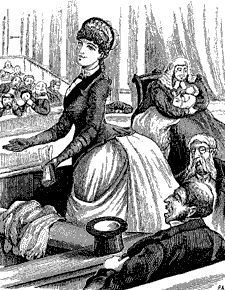
In his 1869 essay The Subjection of Women the English philosopher and political theorist John Stuart Mill described the situation for women in Britain as follows:
"We are continually told that civilization and Christianity have restored to the woman her just rights. Meanwhile the wife is the actual bondservant of her husband; no less so, as far as the legal obligation goes, than slaves commonly so called.
During the 1800s women in the United States and Britain began to challenge laws that denied them the right to their property once they married. Under the common law doctrine of coverture husbands gained control of their wives' real estate and wages. Beginning in the 1840s, state legislatures in the United States and the British Parliament began passing statutes that protected women's property from their husbands and their husbands' creditors. These laws were known as the Married Women's Property Acts. Courts in the nineteenth-century United States also continued to require privy examinations of married women who sold their property. A privy examination was a practice in which a married woman who wished to sell her property had to be separately examined by a judge or justice of the peace outside of the presence of her husband and asked if her husband was pressuring her into signing the document.
